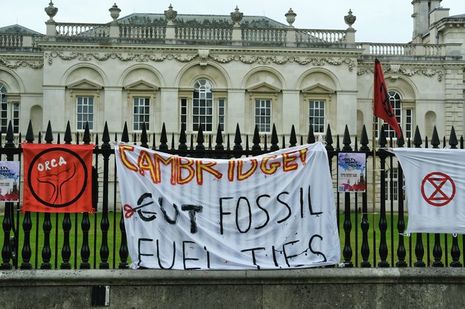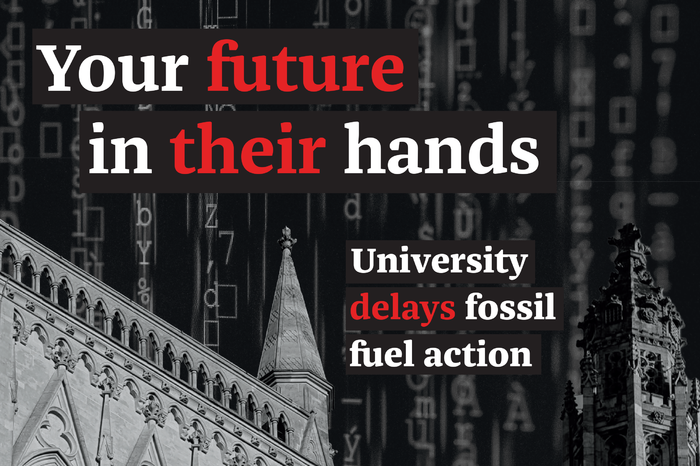Inside Cambridge’s opaque divestments
Cambridge University is refusing to disclose details of its progress on fossil fuel divestment on the grounds of ‘trade secrets’

Colleges have invested tens of millions of pounds with widely criticised asset managers and secretive private equity funds, a Varsity investigation has found.
Cambridge University refused to share details of its progress on divestment with Varsity on the grounds of protecting “trade secrets” and “commercial interests”, while its colleges continue to invest with the world’s most polluting financial institutions.
Meanwhile, three years on from Cambridge’s landmark commitment to remove fossil fuel investments from its £3.5bn endowment fund, a series of Varsity freedom of information requests about divestment progress have been refused on the grounds of “trade secrets”.
Almost a third of the way through the central University-wide endowment fund’s (CUEF) timeline to exclude oil and gas, details on how the contents of the fund have evolved remain largely hidden, and a member of the University Council has stated Cambridge needs to “raise its game” on transparency.
The University justified secrecy on the grounds that disclosing divestment details would “prejudice the commercial interests” of the University, and claimed revealing requested information would “constitute an actionable breach of confidence” with its fund managers and the companies in which it invests.
However, identical Varsity inquiries into colleges’ progress revealed extensive collegiate investments with widely criticised money managers and secretive private equity firms, which are funding fossil fuel expansion.
Queens’ College was shown to invest £12.3 million in four Warburg Pincus private equity funds. Private equity funds are a particularly opaque form of financing, in which investments are made away from public markets. Last year, analysis by two financial watchdogs ranked Warburg Pincus as the second worst private equity offender in terms of fossil fuel portfolios and transparency.
Tens of millions in collegiate investments were also shown to be put into Vanguard funds, an asset manager that has led a pushback against environmental and social governance (ESG) requirements in investing.
Having continued to expand its billion-dollar stakes in the world’s most carbon-intensive companies after the Paris Agreement, Vanguard withdrew from the Net Zero Asset Managers alliance last year.
The alliance, created at COP26 in Glasgow, had united the world’s largest financial institutions around the goal of net zero emissions by 2050 in a last-ditch attempt to limit global heating to 1.5 degrees.
Under pressure from Republicans in the United States, Vanguard has also told the UK’s Environmental Audit Committee that they do not see terminating new coal, oil and gas expansion as part of their climate plans.
King’s and Pembroke had particularly large holdings with the renegade money manager, investing over £100m in Vanguard funds between them.
King’s has indirectly invested millions of pounds in oil and gas companies in this manner. Varsity freedom of information requests have shown that the College has invested £798,000 in Exxon Mobil, £660,000 in Shell, over £560,000 in Chevron, and another £907,000 between BP, Total, and ConocoPhillips.
Other collegiate funds were shown to have exposure to fossil fuel companies, particularly through investments with asset managers like BlackRock and State Street. Amongst those, St John’s College was notable in particular, with several million pounds in indirect oil and gas company holdings through two State Street funds.
Professor Jason Scott-Warren, a member of the University Council, told Varsity: “We need the Cambridge University Endowment Fund to raise its game in terms of transparency and accountability, so that we can be confident that it is genuinely decarbonising”.
The limited details about University divestment that are made publicly available are provided by UCIM, a Cambridge-owned subsidiary that manages the central endowment fund.
Annual reports by UCIM admit the central Cambridge funds’ exposure to “conventional energy” increased last year, while touting investments in “two specialist renewable energy funds”.
“We also need the colleges to align themselves explicitly with the climate policies adopted by the University,” Scott-Warren added.
A spokesperson for the University said: “The most current information on the Cambridge University Endowment Fund’s progress towards its net zero ambitions is publicly available on the University of Cambridge Investment Management website”.
“The Fund also publishes an Annual Report, and holds annual Town Halls where Chief Investment Officer Tilly Franklin reports on the Fund’s progress and takes questions from students and staff”, the spokesperson continued.
A spokesperson for King’s said the College “has not held direct investments in fossil fuels for many years and remains committed to eliminating all fossil fuel investments by 2030”.
“With an increasing range of options available, the College has recently appointed new investment advisors to support ongoing work on the ESG impacts of its holdings and exploration of alternative funds”, they added.
Queens’ College’s approach to investment states: “The College does not invest directly in any fossil fuels and it endeavours to minimise any indirect investments”.
“The College does, however, hold investments in certain funds, such as clean energy funds, where some of a fund’s underlying investments involve companies in which fossil fuel companies may have minority holdings. The College is only interested in the clean energy investment,” it continues.
John’s College’s statement on divestment says: “John’s college divested from all direct fossil fuel investments in 2013 and has no intention of acquiring such direct investments in the future”.
“By 2030 at the latest the College will have no meaningful direct or indirect exposure to securities in fossil fuels companies in the College’s Endowment,” it continues.
 News / Judge Business School advisor resigns over Epstein and Andrew links18 February 2026
News / Judge Business School advisor resigns over Epstein and Andrew links18 February 2026 News / Hundreds of Cambridge academics demand vote on fate of vet course20 February 2026
News / Hundreds of Cambridge academics demand vote on fate of vet course20 February 2026 News / Petition demands University reverse decision on vegan menu20 February 2026
News / Petition demands University reverse decision on vegan menu20 February 2026 News / CUCA members attend Reform rally in London20 February 2026
News / CUCA members attend Reform rally in London20 February 2026 News / Gov grants £36m to Cambridge supercomputer17 February 2026
News / Gov grants £36m to Cambridge supercomputer17 February 2026











